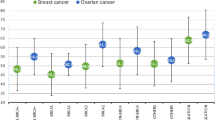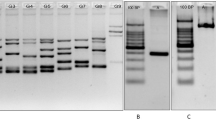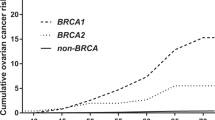Abstract
We described and compared breast and ovarian screening practices in the 2-year period following test result disclosure in female non-carriers from BRCA1/2 mutation-positive families living in two countries, France and Quebec, Canada, which provide universal health care. Four hundred and two (France n=293; Quebec n=109) unaffected female non-carriers from BRCA-proven mutation families provided information about the uptake of mammography, clinical breast examination, breast self-examination, and ovarian ultrasounds using self-administered questionnaires. The frequency of screening practices between study cohorts were compared using logistic regression. Annual mammography was conducted in 23 and 43% of French and Quebecer women participants <50 years of age, respectively (adjusted odds ratio (aOR)=2.72; 95% confidence interval (CI), 1.08–6.81). In women ≥50 years of age, mammography was conducted in 49 and 65% of French and Quebecer participants (aOR=1.77; 95% CI, 0.07–4.51). Overall, 33% of French women and 39% of Quebecer women underwent at least one ovarian ultrasound during the 2-year period following BRCA1/2 test result with no significant difference between cohorts of women <50 years of age. Among older women, Quebecers reported more frequently than French women that they had undergone ultrasound once (aOR=3.00; 95% CI, 1.02–8.83). The frequency of cancer screening practices for female non-carriers from BRCA1/2 mutation-positive families in both France and Quebec exceeded those recommended for similarly aged women in the general population. Our findings highlight the need for clearcut recommendations on the follow-up of women from BRCA1/2 families who are not themselves carriers of a BRCA1/2 mutation.
Similar content being viewed by others
Log in or create a free account to read this content
Gain free access to this article, as well as selected content from this journal and more on nature.com
or
References
Offit K, Garber J, Grady M et al: ASCO Curriculum: Cancer Genetics & Cancer Predisposition Testing. Alexandria, VA: ASCO, 2004.
Korde LA, Mueller CM, Loud JT et al: No evidence of excess breast cancer risk among mutation-negative women from BRCA mutation-positive families. Breast Cancer Res Treat 2011; 125: 169–173.
Domchek SM, Gaudet MM, Stopfer JE et al: Breast cancer risks in individuals testing negative for a known family mutation in BRCA1 or BRCA2. Breast Cancer Res Treat 2010; 119: 409–414.
Katki HA, Gail MH, Greene MH : Breast-cancer risk in BRCA-mutation-negative women from BRCA-mutation-positive families. Lancet Oncol 2007; 8: 1042–1043.
Berliner JL, Fay AM : Risk assessment and genetic counseling for hereditary breast and ovarian cancer: recommendations of the National Society of Genetic Counselors. J Genet Counsel 2007; 16: 241–260.
Dawson SJ, Price MA, Jenkins MA et al: Cancer risk management practices of noncarriers within BRCA1/2 mutation positive families in the Kathleen Cuningham Foundation Consortium for Research into Familial Breast Cancer. J Clin Oncol 2008; 26: 225–232.
Foster C, Watson M, Eeles R et al: Predictive genetic testing for BRCA1/2 in a UK clinical cohort: three-year follow-up. Br J Cancer 2007; 96: 718–724.
Eisinger F, Bressac B, Castaigne D et al: Identification and management of hereditary predisposition to cancer of the breast and the ovary (update 2004). Bull Cancer 2004; 91: 219–237.
Horsman D, Wilson BJ, Avard D et al: Clinical management recommendations for surveillance and risk-reduction strategies for hereditary breast and ovarian cancer among individuals carrying a deleterious BRCA1 or BRCA2 mutation. J Obstet Gynaecol Can 2007; 29: 45–60.
Morrison B : Screening for Breast Cancer: Canadian Task Force on the Periodic Health Examination. Canadian Guide to Clinical Preventive Health Care. Ottawa: Health Canada, 1994, pp 788–795.
Agence Nationale d'Accréditation et d'Évaluation en Santé: Le dépistage du cancer du sein par mammographie dans la population générale: Étude d'évaluation technologique. Paris: ANAES, 1999.
Andrieu N, Easton DF, Chang-Claude J et al: Effect of chest X-rays on the risk of breast cancer among BRCA1/2 mutation carriers in the international BRCA1/2 carrier cohort study: a report from the EMBRACE, GENEPSO, GEO-HEBON, and IBCCS Collaborators' Group. J Clin Oncol 2006; 24: 3361–3366.
Simard J, Dumont M, Moisan AM et al: Evaluation of BRCA1 and BRCA2 mutation prevalence, risk prediction models and a multistep testing approach in French-Canadian families with high risk of breast and ovarian cancer. J Med Genet 2007; 44: 107–121.
Dorval M, Bouchard K, Maunsell E et al: Health behaviors and psychological distress in women initiating BRCA1/2 genetic testing: comparison with control population. J Genet Counsel 2008; 17: 314–326.
SAS Institute: Statistical Analysis System Version 9.1. Cary, NC: SAS Institute, 2006.
Statistique Canada: Enquête sur la santé dans les collectivités canadiennes Cycle 3.1 (2005): Fichier de microdonnées à grande diffusion, Ottawa, Statistique Canada, 2006.
Duport N, Bloch J : Dépistage du cancer du sein; in Guilbert P, Peretti-Watel, Beck F, Gautier A (eds): Baromètre Cancer 2005. Saint-Denis: INPES, 2006, pp 119–126.
Eisinger F, Alby N, Bremond A et al: Expertise collective INSERM-FNCLCC: Recommandations portant sur la prise en charge des femmes ayant un risque d'origine génétique de développer un cancer du sein et/ou de l'ovaire. Bull Cancer 1999; 86: 307–313.
Leschot NJ, Vejerslev LO : Proceedings of the EUCROMIC workshop on prenatal diagnosis. Eur J Hum Genet 1997; 5: 1–6.
Blondel B, Supernant K, Du Mazaubrun C, Breart G : Trends in perinatal health in metropolitan France between 1995 and 2003: results from the National Perinatal Surveys. J Gynecol Obstet Biol Reprod (Paris) 2006; 35: 373–387.
Breton P : Échographies foetales: Une crise majeure se dessine. La Presse: 22 mai, 2007, A9.
King ES, Rimer BK, Trock B, Balshem A, Engstrom P : How valid are mammography self-reports? Am J Public Health 1990; 80: 1386–1388.
Caplan LS, McQueen DV, Qualters JR, Leff M, Garrett C, Calonge N : Validity of women's self-reports of cancer screening test utilization in a managed care population. Cancer Epidemiol Biomarkers Prev 2003; 12: 1182–1187.
Brett J, Austoker J, Ong G : Do women who undergo further investigation for breast screening suffer adverse psychological consequences? A multi-centre follow-up study comparing different breast screening result groups five months after their last breast screening appointment. J Public Health Med 1998; 20: 396–403.
Gram IT, Slenker SE : Cancer anxiety and attitudes toward mammography among screening attenders, nonattenders, and women never invited. Am J Public Health 1992; 82: 249–251.
Lerman C, Trock B, Rimer BK, Boyce A, Jepson C, Engstrom PF : Psychological and behavioral implications of abnormal mammograms. Ann Intern Med 1991; 114: 657–661.
Elmore JG, Barton MB, Moceri VM, Polk S, Arena PJ, Fletcher SW : Ten-year risk of false positive screening mammograms and clinical breast examinations. N Engl J Med 1998; 338: 1089–1096.
NIH Consensus Development Panel on Ovarian Cancer: NIH consensus conference: Ovarian cancer. Screening, treatment, and follow-up. JAMA 1995; 273: 491–497.
Preston DL, Mattsson A, Holmberg E, Shore R, Hildreth NG, Boice Jr JD : Radiation effects on breast cancer risk: a pooled analysis of eight cohorts. Radiat Res 2002; 158: 220–235.
Berrington de Gonzalez A, Reeves G : Mammographic screening before age 50 years in the UK: comparison of the radiation risks with the mortality benefits. Br J Cancer 2005; 93: 590–596.
Pharoah PD, Antoniou AC, Easton DF, Ponder BA : Polygenes, risk prediction, and targeted prevention of breast cancer. N Engl J Med 2008; 358: 2796–2803.
Acknowledgements
The GENEPSO study was supported by the Fondation de France and by La Ligue Nationale Contre le Cancer; the psychosocial companion project was supported by the Institut National du Cancer (Grant No. R08097AA/RPT08011AAA INCA). The INHERIT BRCAs research program was supported by the Canadian Institutes of Health Research (Grants Nos. CRT-43822 and CRN-87521) and the Canadian Breast Cancer Research Alliance (Grant No. 11383). Michel Dorval holds a Fonds de la Recherche en Santé du Québec Investigator Award; Jacques Simard is Chairholder of the Canada Research Chair in Oncogenetics. The funders had no role in study design, data collection, or in analysis and interpretation of the results, or in the decision to publish.
Author information
Authors and Affiliations
Consortia
Corresponding author
Ethics declarations
Competing interests
The authors declare no conflict of interest.
Appendices
Appendix I
The following members of the GENEPSO cohort contributed to this research: Hélène Cannoni-Zattara: CHU de la Timone, Marseille; Olivier Capron: Institut Gustave Roussy, Villejuif; Hélène Dreyfus: Clinique Sainte Catherine, Avignon; Thierry Frebourg: CHU Charles Nicolle, Rouen; Marc Frenay: Centre Antoine Lacassagne, Nice; Jean-Pierre Fricker: Centre Paul Strauss, Strasbourg; Paul Gesta: CHR Georges Renon, Niort; Rosine Guimbaud: Institut Claudius Regaud, Toulouse; Caroline Logeat, Inserm/IRD, Marseille; Elisabeth Luporsi: Centre Alexis Vautrin, Vandoeuvre les Nancy; Nguyen Tan Dat: Institut Jean Godinot, Reims; Hagay Sobol: Institut Paoli-Calmettes, Marseille; Laurence Venat-Bouvet: CHU Dupuytren, Limoges; Philippe Vennin: Centre Oscar Lambret, Lille.
Appendix II
The following members of INHERIT BRCAs contributed to this research: Paul Bessette: Service de gynécologie, Centre hospitalier Universitaire de Sherbrooke, Fleurimont; Peter Bridge: Molecular Diagnostics Laboratory, Alberta Children's Hospital, Calgary; Rachel Laframboise: Département de génétique, Centre hospitalier universitaire de Québec; Bernard Lespérance and Roxane Pichette: Hematology Oncology, Hôpital du Sacré-Cœur de Montréal, Université de Montréal, Montréal; Jean Lépine: Centre hospitalier régional de Rimouski, Rimouski; Elizabeth Maunsell: Faculté de médecine, Université Laval, Unité de recherche en santé des populations, Centre de recherche du CHA universitaire de Québec; Louise Provencher: Centre des maladies du sein Deschênes Fabia, Hôpital du Saint-Sacrement, Centre hospitalier affilié universitaire de Québec; Patricia Voyer: Clinique des maladies du sein, Carrefour de Santé de Jonquière.
Rights and permissions
About this article
Cite this article
Dorval, M., Noguès, C., Berthet, P. et al. Breast and ovarian cancer screening of non-carriers from BRCA1/2 mutation-positive families: 2-year follow-up of cohorts from France and Quebec. Eur J Hum Genet 19, 494–499 (2011). https://doi.org/10.1038/ejhg.2010.227
Received:
Accepted:
Published:
Issue date:
DOI: https://doi.org/10.1038/ejhg.2010.227
Keywords
This article is cited by
-
Genetic counseling content: How does it impact health behavior?
Journal of Behavioral Medicine (2015)
-
Experience of BRCA1/2 mutation-negative young women from families with hereditary breast and ovarian cancer: a qualitative study
Hereditary Cancer in Clinical Practice (2013)
-
Comparison of the Screening Practices of Unaffected Noncarriers under 40 and between 40 and 49 in BRCA1/2 Families
Journal of Genetic Counseling (2013)
-
Family Communication Following BRCA1/2 Genetic Testing: A Close Look at the Process
Journal of Genetic Counseling (2013)
-
Self-reported mammography use following BRCA1/2 genetic testing may be overestimated
Familial Cancer (2012)



